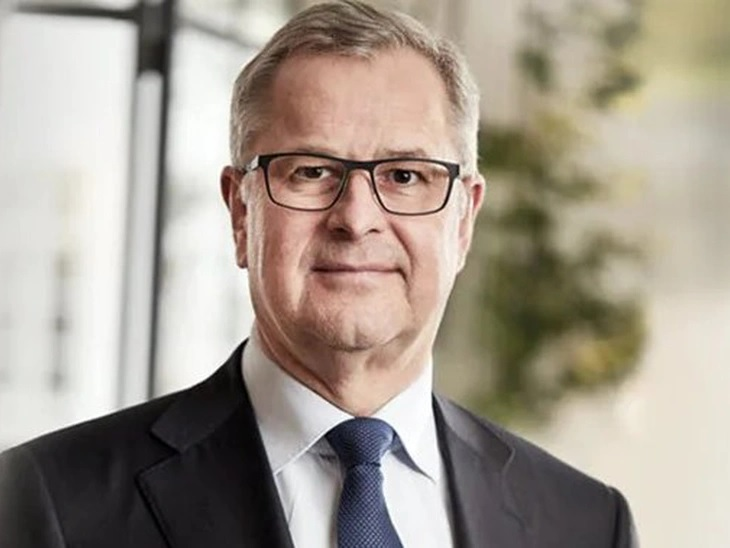
Group has invested in solutions to reduce emissions by around five million tons of carbon dioxide per year by 2030
T&B Petroleum/Press Office
To meet the Science Based Targets (Sbti) targets that limit global warming to 1.5°C by 2040 and provide green logistics options throughout the supply chain by 2030, A.P. Moller - Maersk, an integrated logistics company, has started to implement different energy transition initiatives in Brazil.
To reduce the emission of CO2 into the atmosphere, the group has invested in building a portfolio of climate solutions that will result in the reduction of emissions by around five million tons of carbon dioxide per year by 2030.
“As a global provider of end-to-end logistics services across all modes of transport, it is our strategic goal to extend our zero CO2 ambition across the entire business. The science is clear, we must act now to make significant progress this decade,” says Soren Skou (photo), CEO of A.P. Moller - Maersk.
Land electrical power (AMP - Alternate Maritime Power)
As of January 2023, four ships of the Alliance's Explorers class, which carry out cabotage in Brazil, will receive a new technology - the installation of electrical equipment that connects the ship to a source of energy in the port, with this, it will not be more necessary to keep combustion engines running during the time the ship is berthed. “The ship's generators provide power for the equipment. With this system, it will be possible to turn off the engines, plugging the ship into shore power and thus eliminating the emission of CO2 by ships during operations in ports”, explains Carlos Rocha, Alliance Ship Fleet Manager. He adds that although there is still no terminal in Brazil that provides this facility, Maersk understands that this will happen very soon, and that is why it is already investing in technology.
Autonomous monitoring of dissolved CO2 concentration in the oceans
Aliança, in partnership with the GEOMAR-Kiel Institute and Depto. of Oceanography at UERJ, will participate in the research project that monitors the absorption of CO2 by the oceans. In 2022, the ship Vincente Pinzon was equipped for the autonomous measurement of oceanographic data, in real time, including the absorption of CO2 in the South Atlantic along the Brazilian coast.
Cajamar Warehouse
The A.P. Moller - Maersk inaugurated, at the beginning of September, a new warehouse in Cajamar, in the state of São Paulo. Covering 19,400 square meters, the new location is LEED Platinum certified (Leadership in Energy and Environmental Design), including solar panels on the roof, rainwater recovery and waste management system, thermal felt insulation and equipment. electric material handling equipment, such as forklift trucks equipped with a lithium battery.
APM Terminals Pecem and Suape
The goal of the A.P. Moller - Maersk is to deploy electrical equipment in all its terminals in the country. The Pecém Terminal, for example, has recently invested R$150 million in the purchase of new equipment, including three RTGs, cranes for operating containers in the yard. The latest generation models will be the first of their kind to operate in Pecém.
There are several advantages of operating with RTGs such as productivity gains, since the cranes walk over the piles, facilitating access to containers positioned in the middle of the blocks, reducing movements and improving the terminal's internal logistics. Furthermore, the models purchased for Pecém are electrified and do not use diesel oil. As a result, the operation becomes cleaner and more sustainable, with a reduction in CO2 emissions.
In Suape, APM Terminals plans to invest up to R$ 2.6 billion in the new container terminal and start operations with an initial capacity of 400,000 TEU environmental commitments, including electrical equipment.” says Leonardo Levy, director of Expansion at APM Terminals in Brazil.
CO2 reduction
Maersk has ordered a total of 19 vessels with engines capable of operating on green methanol. Next year, Maersk's first container ship powered by green methanol and with a capacity of 2,500 TEU will start operations in Europe. As of 2024, 18 large ships - with a capacity for more than 17,000 TEU, will also sail around the world on green fuel.
Aliança Navegação e Logística, a Brazilian logistics operator belonging to the A.P. Moller-Maersk, is building the first two ocean-going ATB barges for container transport in Brazil. The two sets will transport cargo more safely and efficiently, as they allow the simultaneous transport of a greater volume of cargo compared to other vessels and land transport. In addition, the main engines may, in the future, run on green fuels such as methanol and ethanol.

Contact us